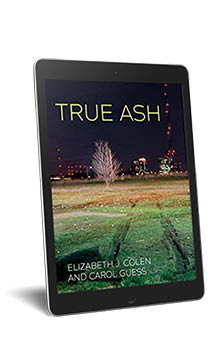READ AN EXCERPT

If trees could talk, you said. If they could tell us what they saw. But if you didn’t want to talk about it, why would a tree?
We walked in the arboretum as if nothing had happened. Past Japanese Maples, Witch Hazels, Legumes. Through Pinetum and across the stone footbridge. The math of it, was what you said.
We stopped to eat among Hollies and Hawthorns. When you sliced an apple, the red cored curl made me want to ask questions. The thing that had happened was unlikely to happen again, but you needed to be sure, so you carried a knife. You wanted me to carry one, too, but I was clumsy and sometimes fell. Even in the arboretum I liked to wear heels, the kind most women wear at night. It felt safer to wear heels during the day. At night I wore flats, shoes that could run.
When we got back to your apartment, I always cleaned the bottom of my heels with a paper towel. I did this sitting on the floor in my skirt, and sometimes you watched, lifting my hem. After a while I stopped wearing anything underneath my skirt and our walks got shorter.
There was nothing unusual about them, you said. Who? I asked. We were eating dinner at your place.
The couple, you said. In the arboretum. The couple I saw in True Ashes that day. I thought you said it happened in Hollies. God no, you said. Nothing like that. I sprinkled salt on my salad.
Sometimes I ate salty things and sometimes sweet, but never at once. You claimed you couldn’t tell salt and sugar apart. But you said that about a lot of things.
I thought about all the couples I’d seen walking in the arboretum. How the woman sometimes bent into the man as if she couldn’t walk on her own. How the man explained the names of trees while she extended her branches.
We’re not like that, you said.But what did you mean?
I wanted to ask what it was that you’d seen. I’d avoided the news for a week after that. You saw it first, from the outside, a stranger. On the cusp of True Ashes, and who knew what they saw.
Maybe trees bend toward us on purpose.
Sunlight, you said. The science of roots.
But maybe it’s more. Maybe they feel things.
Would you stop eating plants if you knew what they felt?
I didn’t answer, just rubbed my ring across my wrist.
You lifted my hem. Bunched my skirt around my waist and straddled me. My shoes and hands were dirty, but you wanted my mouth, so it didn’t matter.
The couple, I asked. What was she wearing?
Did I mention a woman?
I assumed they were straight. You smirked.
So it was two men. Or two women? Who else could it be, walking in pairs?
—
The next morning you went to work and I worked from your apartment. It was part of our agreement to trade. Sometimes your upstairs neighbor played music, pot smoke drifting down through the vents.
At noon I walked to the corner store for a sandwich. While I was browsing I noticed a pack of bubblegum cigarettes. I hadn’t seen that kind of candy in years. Something about advertising smoking to children.
Can I have these for half? I asked. The clerk looked at the date on the faded pink wrapper. Just take them. We don’t even carry those here. I put the pack in my pocket. Bought coffee and a loaf of bread.
Walked from the store to the arboretum. Scattered bread, waited for birds. They swooped down from the sky to land at my feet. If you would wait. If you would stand very still. When you came home that night you asked if I’d gone there. Why do you ask? Because of the dirt.
It was true. I’d tracked dirt through the kitchen. In the movies you liked, girls licked the floor clean. I scrubbed with a towel while you uncorked a bottle. Then you poured two glasses and we sat on the couch.
About The Book
Microchips that don’t know when to stop, pop culture clones poised to take over the planet, a mysterious burial in a popular park, candy cigarettes wreathed in sugary ash. In these interlocked short stories, Elizabeth J. Colen and Carol Guess conjure characters guided by instinct but misguided by technology, longing for intimacy but propelled by desire. Taken together, these stories detail the spectrum of human loss and describe the rise and fall of a fictitious Seattle company governed by unruly appetites, a world of glass windows where privacy comes with a price.

Continue Reading…
Article originally Published in the February/March 2020 Issue “Short Stories”
